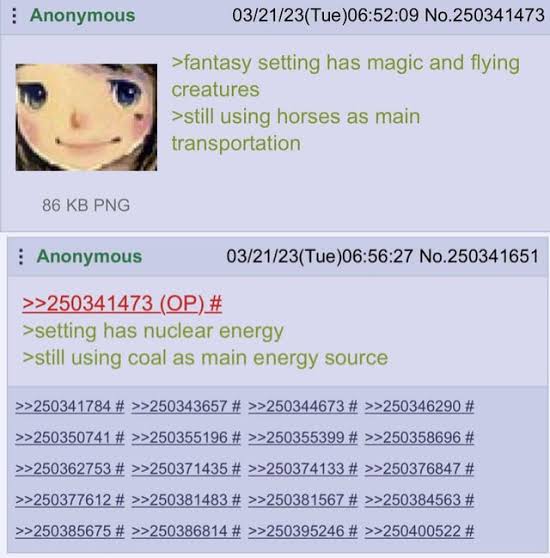

tbf, we have airplanes, but most goods are still being transported over lands or seas.
Totally totally no downsides.
What downsides are you concerned about
Proliferation. Nuclear waste. Long term storage of said waste. Dependence on raw materials that are only available in a few places. Lack of economic viability. Lack of clear timelines for development of new technologies. Monopolistic practices of proprietors. To name just the most important ones. Oh, and the old blowy uppy thing, of course.
Nuclear waste. Long term storage of said waste
Solved issue, caskets can be stored above ground and take up very little space, buried if it starts to take up too much surface space
Dependence on raw materials that are only available in a few places
Thorium rather than uranium fuel solves this
Lack of economic viability
Just not true
Lack of clear timelines for development of new technologies
Also not true
Oh, and the old blowy uppy thing, of course.
Seriously not an issue these days, we don’t build them and run them like the Soviet Union did anymore
If you think nuclear waste is a “solved issue” you just show how little you understand the subject matter. So you’re going to store nuclear waste above ground for a couple of millennia? How’s that going to work out? And thorium reactors might some day become a viable technology. But that is at best decades away. That is not a solution for any present day problem. And what about all those old and aging legacy reactors that are being kept running beyond their design lifespan? Surely nothing can go wrong there.
But it doesn’t matter. Despite all the irrational exuberance of the nukebros it’s just not going to happen. The economics were never there and still aren’t.
So you’re going to store nuclear waste above ground for a couple of millennia?
Literally yes, it’s not just left out in the open air, they’re stored in specialized containers that use inert gas and concrete to block the radiation from getting out. They can also then be buried beneath the ground for extra protection
And thorium reactors might some day become a viable technology. But that is at best decades away.
It is most certainly not decades away at best unless fear mongering managed to slow research more than it already has done, but that’s not an issue with the technology at all
And what about all those old and aging legacy reactors that are being kept running beyond their design lifespan? Surely nothing can go wrong there.
You update them, which is how they’re operating beyond their initial designed lifespan. Current idea in the field is to replace aging uranium reactors with molten thorium as they’re apparently pretty simple to convert over
To quote you on this topic:
you just show how little you understand the subject matter
You’re telling me humanity will able to manage nuclear waste for hundreds to thousands of years, given the fall of multiple great societies over the last few thousand years?
It’s not even a solved problem how to communicate danger with signs[1], and you think knowledge about where nuclear waste is being stored will be preserved for a thousand years?
I really envy you for your optimism in humanity.
It was a bad call to stop, but now it’s an equally or worse call to start again.
Renewables win on essentially every measure and get better every day while nuclear gets worse every day.
Another important point is the flexibility of wind and solar. The minimum investment to get some power out of them is very low, and a park can start generating power before fully completed and can easily be scaled up or down in capacity during construction if estimates change.
Nuclear on the other hand is a huge up-front cost with little flexibility and no returns until completion, which could take a decade or more.
Even if it wasn’t more expensive, nuclear would still be financially risky. Many things can happen that effect power consumption and prices during the time it takes to build a nuclear plant. It can still be valuable for diversification though.
That’s a lie. Renewables produce more CO2 than Nuclear reactors per unit energy produces. They can also be significantly more dangerous (higher number of deaths per unit energy) in the case of hydro power or biomass. Solar and batteries require various rare materials and produce significant pollution when manufactured and must be replaced every 20 or 30 years.
That’s a lie.
Not really, no.
Renewables produce more CO2 than Nuclear reactors per unit energy produces.
From what I gather, wind is on par with nuclear. Other renewables have slightly more than either wind or nuclear, but compared to the other nonrenewable alternatives either option is far better.
They can also be significantly more dangerous (higher number of deaths per unit energy) in the case of hydro power or biomass.
You left out that solar and wind are largely on par or safer than nuclear per unit of energy. All of these options are again far safer than other nonrenewables.
Solar and batteries require various rare materials and produce significant pollution when manufactured and must be replaced every 20 or 30 years.
As opposed to the ever so clean extraction and storage of nuclear fuel? Come on.
And all of this leaves out the most important aspect - nuclear is incredibly expensive compared to renewables, and is trending more expensive each year, while renewables are trending in the opposite direction. This means that for the same amount of resources, we will be able to displace more nonrenewables, leading to a net reduction in deaths/emissions pursuing this route as opposed to nuclear.
Of course, I have nothing against fully privately funded nuclear. If private actors can make the economics work under safe conditions, then nuclear construction is an obvious net positive. When they displace public investment in renewables, however, then they are a net negative.
Not really, no.
Have you actually looked at the data? You might be surprised.
As opposed to the ever so clean extraction and storage of nuclear fuel? Come on.
Yes actually. Uranium mining isn’t nearly as bad as needing tons of lithium, cobalt, and who knows what that goes into solar panels. Thorium containing materials are literally a byproduct of other mining operations that gets thrown away.
From what I gather, wind is on par with nuclear. Other renewables have slightly more than either wind or nuclear, but compared to the other nonrenewable alternatives either option is far better.
Nope. Wind generates 11 tons of CO2 where Nuclear only makes 6. Solar isn’t even close. Biomass is the worst of the renewables and is closer to fossil fuels in its pollution levels than the other clean sources of energy.
https://ourworldindata.org/safest-sources-of-energy
And all of this leaves out the most important aspect - nuclear is incredibly expensive compared to renewables, and is trending more expensive each year, while renewables are trending in the opposite direction. This means that for the same amount of resources, we will be able to displace more nonrenewables, leading to a net reduction in deaths/emissions pursuing this route as opposed to nuclear.
Is it? Most people aren’t factoring the cost of energy storage. No one is suggesting Nuclear as the only source of energy. It is very helpful though for grid firming and reducing the amount of expensive and environmentally destructive energy storage therefore reducing the overall cost of operating the grid while increasing reliability and reducing land usage and environmental damage.
While the upfront investment in reactors is large, the cost per energy produced and ongoing costs are quite low. Lower in many cases than fossil fuels like gas. Plus reactors last longer than solar panels and wind turbines.
Of course, I have nothing against fully privately funded nuclear. If private actors can make the economics work under safe conditions, then nuclear construction is an obvious net positive. When they displace public investment in renewables, however, then they are a net negative.
What happened to the idea that renewables didn’t need public funding anymore? If it’s really so cheap as you say that wouldn’t be necessary.
The reality is both renewables and nuclear needed huge state investments to get off the ground.
I’ve always found it slightly funny that nuclear power is technically just a fancy steam engine.
I swear Nuclear Reactors were designed by a chemist with a grudge against a physicist and engineer.
I never understood that either. It seems like the steam production is an extra step.
So my general understanding is that you can use a magnet to create an electrical current. Its like it pushes the electrons, like a paddle pushing water. So they coil a bunch of wire around a magnet and rotate the magnet, which moves the electrons in the wire and that gets you electrical power. But you need something to push that magnet around, so you attach that to a big ass fan and use steam to push the fan. That’s your turbine. Nuclear power is just using a hot rock to make the steam. Hydroelectric power uses a river to push the turbine. Wind power is doing the same thing, just uhhh, with wind.
Jesus christ this comment deserves a noble prize. Incredibly succinct explanation of something I didn’t get before.
I’m not really sure how else you’d do it. The energy we can get out of fission is in the form of heat, and steam isn’t as compressible as just gas and it’s easy to make with just heat. Combine that with electromagnetism giving you electricity by spinning some magnets around some coils, and there you go.
It’s probably possible to get some air hot enough and do some fancy convection work to get it to spin a rotor, but that’s going to be really inefficient.
You could also use the heat to make materials glow and put a solar panel nearby, but that’s also going to be pretty inefficient.
Get beta radiation and then put the electrons directly into the wires.
One by one.
Artisanal, hand wrought electricity.
Almost all power source that generate electricity are fancy steam engines.
Wait, it’s all steam engines?
Hydro, wind, solar, and wave/tide energy capture are not.
The crazy part is photovoltaics are the only power source that doesn’t spin something to make electricity. Truly an outlier.
solar
Except the ones that are. (Concentrated solar power)
…and the fancy steam engine version of solar is probably greener to build that photovoltaics, since it’s basically just a boiler and some mirrors.






